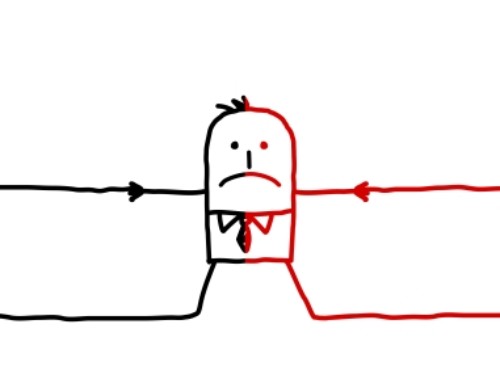In this article, I provide strategies to help you and your relationship partner manage problems which never seem to go away.
One of the challenges of a relationship is dealing with problems. Early on in a relationship when you and your partner are dating, problems may appear to be non-existent as your focus is on the positive attributes of each other while you enjoy good times together. Eventually, however, problems will inevitably arise. If both of you are reasonable and open to compromise and discussing issues constructively, you can work through many of these disagreements to find mutually agreeable solutions. However, at some point you will discover that there are some problems in your relationship which never seem to go away completely despite your best efforts at solving them. These problems on which you and your partner become gridlocked are typically related to personality characteristics which increasingly become sources of annoyance for both of you. In this article, I will provide strategies to help you and your partner manage what relationship expert John Gottman refers to as ‘perpetual problems.’
What are perpetual problems in a relationship?
In couples counselling or relationship counselling parlance, perpetual problems are those problems which are by their nature difficult to resolve. The reason for this is that the source of these problems is differences in personality and background between you and your partner. In other words, because you have different personalities and backgrounds, you will necessarily have different perspectives on particular issues. Because each of your views is strongly rooted in long-standing personality characteristics and experiences in your background—many of which may be highly emotional experiences—each of you necessarily views your perspective as a valid one or perhaps even ‘the right one.’ When these differences in personality and background come head-to-head in a disagreement over a particular issue, it is necessarily very difficult for you and your partner to move toward each other’s position because of the strong roots underlying each of your positions. In the next section, I will give several examples of how perpetual problems manifest themselves in relationships.
Examples of perpetual problems in relationships
Each of the following scenarios illustrates how perpetual problems manifest themselves in relationships. In each case, the dynamic is present in which the problems arise from the two relationship partners differing in their backgrounds and/or personalities: (1) One partner is careful with spending because of having endured tight financial circumstances during their upbringing while the other partner is more free-spending because of a history of coveted emotional experiences associated with gift-giving; (2) One partner is very spontaneous while the other is highly predictable. He is upset that he cannot depend on her because of her ‘flightiness’ while she finds him unexciting because he needs everything planned out; (3) One partner is punctual because he was raised by parents who instilled the importance of being on time. The other was raised by parents and in a culture in which being on time was not considered important; (4) One partner is extroverted and the other is introverted. The extroverted partner dislikes the fact that her partner does not want to go out very often and would prefer to spend time quietly at home. The other partner feels drained by his partner’s insistence that they go to parties and other social occasions regularly; (5) One partner likes their home to be kept neat and tidy. Growing up in an orderly environment in which one could be proud of displaying a neat house leads them to dislike his partner’s untidiness. She grew up in a house in which order and neatness were not the norm. She feels suffocated by her partner’s insisting that their house look pristine. If you relate to any of these scenarios, you will recognize that the relationship problems featured tend to recur on an ongoing basis. So trying to make these issues go away completely as you would with other problems is likely to be an exercise in futility. In the following section, I will detail several techniques you and your partner can use which will help you manage perpetual problems so that they do not have a significant negative impact on your relationship.
How to manage perpetual problems to limit their negative effects on your relationship
The following are several strategies which have been found to be effective in managing perpetual problems so that they do not have a major negative impact on your relationship:
(1) Don’t view you and your partner negatively because you have perpetual problems. Couples I work with typically breathe a sigh of relief when they hear that every relationship, no matter how good, has perpetual problems. It is a doable challenge to manage perpetual problems but it is a lot more difficult to do this if you and your partner view yourselves as failing in your relationship because you haven’t solved these problems. Recognizing that there are certain non-solvable problems in every relationship, including yours, is the first step in managing these problems;
(2) View your perpetual problems in the context of the positive aspects of each other and your relationship. No relationship or partner is perfect (including you!). When dealing with a perpetual problem which is related to characteristics of your partner which you don’t like, remind yourself of the many good aspects of your partner and your relationship;
(3) Recognize the positive side of personality characteristics which lead to perpetual problems. Most of the personality characteristics of your partner that become perpetual problems which irritate you have a positive side to them. For example, your partner may annoy you because of her unpredictability but you also find her spontaneity exciting. Remind yourself when you see the negative side of these characteristics that you enjoy the positive side of these aspects of your partner and that it is impossible to have the positive side without the negative side;
(4) Become aware of the background and meaning underneath your partner’s position when discussing a perpetual problem. It is a lot easier for you and your partner to dialogue constructively about a perpetual problem when you can understand the meaning underneath each of your positions in terms of background experiences and personality characteristics. For example, your partner’s fixation on things needing to be planned out to the letter would be easier for you to take if you learned that it is rooted in a childhood background in which they suffered because of a chaotic home life;
(5) Try to find ways to respect and honour each other’s personalities and backgrounds. Once you and your partner are aware of each other’s backgrounds and personalities, try to find ways to honour these. For example, if you know your partner values spontaneity, try to find ways to surprise her even if it’s not typically the way you operate. If you know your partner is more introverted than extroverted, suggest that the two of you take a break from going out on a given evening;
(6) Look for areas of common ground. For issues which are difficult to address, Gottman recommends the ‘circle approach’ to help you and your partner find common ground. In this technique, each of you independently draws a small circle and a larger circle surrounding it on your respective pages. You then each write in the small circle parts of the issue on which you cannot give ground and write in the larger circle those aspects of the issue on which you can compromise. You and then partner then compare your larger circles to look for areas of agreement and movement on the issue. For this technique to help you and your partner with perpetual problems, Gottman recommends that you precede it with an exploration of the meaning underneath your respective positions. This will make it more likely that both of you will be motivated to compromise when using the circle technique;
(7) Have a sense of humour about you and your partner’s differences. Having a sense of humour makes it easier to cope with many difficult situations in life including perpetual problems in your relationship. In this regard, I invite couples I work with in my role as a Calgary psychologist and a Cochrane psychologist to look for examples of perpetual problems in relationships on television sitcoms. This allows them to see the humourous side of these problems. The examples they watch also typically feature characters who find each other’s habits annoying much of the time yet underneath they care for and respect each other. My personal favourite sitcom example was The Odd Couple which featured two male divorced roommates—the neatness-obsessed Felix Unger and the ultimate slob Oscar Madison. Although their habits drove each other crazy at times, Felix and Oscar learned to manage their differences and they clearly liked and respected each other.
What do you do if the perpetual problems in your relationship are ‘deal-breakers’?
Gottman said that one of the secrets to having a good relationship is choosing a partner with whom the perpetual problems you experience are ones you can live with. In this article, I have provided strategies to make it easier for you to live with these problems. However, Gottman’s statement acknowledges that there will be some perpetual problems which are ‘deal-breakers’ leading you to end your relationship. Some common deal-breaker scenarios involve being in a relationship with a partner whose negative characteristics cause you so much distress that remaining in the relationship would be ill-advised. Being with a partner whose personality is abusive, dishonest, overly dependent or who is regularly unfaithful are a few such examples. In other instances, deal-breaker situations are a matter of personal preference. Examples of this type include ending a relationship because your partner doesn’t want to get married or have children or isn’t ambitious enough in their career aspirations. Obviously, it’s your right at any time to end a relationship for any reason including the presence of perpetual problems which are annoying to you. Keep in mind, however, that when you end one relationship because of perpetual problems which annoy you that you will certainly be faced with a new set of annoying perpetual problems in your next relationship. If you find yourself ending one relationship after another because of perpetual problems, this may be a signal for you to learn how to manage these problems. Practicing the strategies I discussed in this article would be a good step in that direction.
May you and your relationship partner become expert managers of your perpetual problems,
-Dr. Pat







Leave A Comment